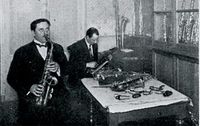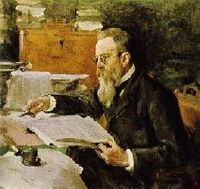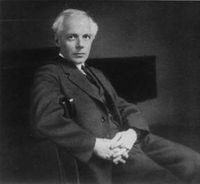Sax-Stories 2:
Just to late!?
We, classical saxophonists, are very proud that we have conquered a vast place in today´s musical world and that our instrument is accepted by composers, musicians and audience.
But when we look at the history of the saxophone, then I get the idea that we were always just to late and are we really accepted?
Let´s have a look at several periods in music history and see what the development of the saxophone has brought us in that specific area.
From the inventing of the saxophone to 1900 there were, especially in France a lot of people who were surprised and delighted with the instrument. First Berlioz! He writes the famous article on Sax´ new invention, but that did not lead to any note for the instrument. Did he ever talked again on the saxophone? I do not think so and why did he not write the famous english-horn solo in the Overture Carnaval Romain for alto saxophone or his “Harold en Italie” as an alternative saxophone-solo?
And what about Rossini? He too complimented the sound of the saxophone, but also forgot to write anything for the instrument. Carl Maria von Weber knew clarinetist Carl Baermann and wrote his two Concertos for him. Probably there wasn't any saxophonist famous enough, to inspire him to write anything for our instrument. No, Mr. Wuille, Lefèbre, Mayeur and even Moeremans, Henton and Combelle committed their selves with music that was popular for woodwinds in those days, but which were not high standars compositions as the works by Liszt, Brahms and Berlioz, to mention a few (Sorry, Mr. Singelée en Sir Demersseman!).
Francois Combelle at the Selmer fabric
Then there was new hope. Nicolaï Rimsky Korsakov (1844-1908) wrote some Concerto´s for wind-instruments and band. The saxophone was already an important instrument in several military bands. In France, Belgium and the Netherlands the saxophone was also used to perform solo pieces and in America audiences learned to know the instrument. Rimsky Korsakov wrote a fantastic trombone concerto, which is still performed today. He composed a concerto for the oboe and one for clarinet, but forgot the saxophone and we saxophonists were so proud, that the instrument was settled in the military bands!
And that are just some of them. I do not dare to mention Johannes Brahms (1833-1897) , Peter Tschaikowski (1840-1893) and some other famous romantic composers, who could have known the saxophone or at least had heard of it. Why didn't Gustav Mahler and Anton Bruckner use the saxophone in heir large build symphonies?
Did we get just to late on the scene or was there a lack of capable, motivated and fanatic saxophone-players??
Nicolaï Rimsky Korsakov
Let´s go on into the 20th century. We all know that Debussy was not really happy with the commission of Elisa Hall. Yes, he needed the money, but he had no interest at all in the saxophone and in Mrs. Hall´s playing. Thank God that André Caplet en Vincent d´Indy were there at the time, but the Caplet is not a really solo-piece and for the most of us d´Indy´s superb Choral Varié opus 55 is not enough a technical showcase. So this piece is not really interesting for soloists, nor conductors. During the same period there was Paul Gilson. He wrote two magnificent Concerto´s (the 2nd was even reworked in the 1930´s), both for Elisa Hall, who could not and did not play those pieces, because they were technically to difficult for her. Unfortunately Gilson was a Belgian citizen and those composers were not asked for on the international plan at the time (as is also today). Nevertheless I think, that both Gilson Concerto's are as important to the saxophone as Carl Maria von Weber's works are for the clarinet.
Then Maurice Ravel: he knew the saxophone so well, that he wrote in his Bolero a part for the F-sopranino, an instrument, that even in the 1920s already was obscure. Did he really know the instrument or just from the famous instrumentation book by Berlioz? I once read that Ravel should have said: “my string-quartet should sound as a saxophone-quartet”. A good statement as we know now through the different transcriptions and recordings, but why then did he not write anything for saxophone-quartet. Until the 1930s we were again just to late, then Schönberg, Alban Berg, Bela Bartok (it seems that Sigurd Rascher did contact Bartok, but that he told Rascher that he was not interested. A question of money knowing Bartok's financial problems?) nor Zoltan Kodaly or Edward Elgar for example did write an interesting piece for the saxophone.
Bela Bartok used the saxophone in some of his orchestral pieces, but did not any attempt to write a solo-work for the instrument.
And then there was our rescue! Glazunow, Ibert, Martin, Villa-Lobos, Milhaud, Larssen. They loved, they admired the saxophone, but their solo-contributions or quartet-writing was very sparse. Glazunow was almost dying as he wrote his concerto, Ibert wrote the famous Concertino da camera and some little things but no other essential work anymore. Villa-Lobos* and Milhaud used the instrument frequently in their orchestral works, but how often are this pieces been played by modern orchestra´s?
*Marcel Mule never played the famous Fantasia! Had he taken the chance, then Villa Lobos perhaps had been interested in writing something for his quartet!
For some obscure reason Prokofief used the tenor saxophone in some of his most famous pieces (Romeo and Juliet, Alexandre Nevski), but some chamber-music or a solo-piece with piano or orchestra did not belong to his interests. We are happy with the Konzertduett of Hindemith, but his Sonata is a French hornpiece. The saxophone arrangement shows Hindemth´s ideas of the instrument: it´s a French horn! And let us be honest: do our famous composers really belong to the regular concert-repertoire?
Up to 1970 we had a lot of material and even a lot of good stuff (Pierre Max Dubois, Henri Tomasi, Eugene Bozza, Marcel Poot, Erland von Koch and others are not the most famous composers today, but they wrote some really fine music for the saxophone), but I miss Igor Strawinsky, Witold Lutoslawski, Aaron Copland, Leonard Bernstein, Benjamin Britten, Olivier Messiaen and Dimitri Shostakovich to name a few of the greatest. Were we saxophonists not good enough for the most important composers of the time or did they just not like the sound of the instrument? Or were we, again, just to late?
And now, in 2008? I think we have managed to keep up with musical life and we try to get all today´s important composers to write for our instrument. But time must still show us if we did make the right choices. Thereby we still miss a work by for example Pierre Boulez, Hans Werner Henze or Bernd Aloïs Zimmermann. A concerto like Zimmermann´s trumpet-piece “Nobody Knows” would be very welcome. And Krisztof Penderecki? Did he write a saxophone-concerto?*
Looking back at history, I still have the feeling that there went something wrong with our instrument. It stood too long at the side line and was not seen by a large group of important composers. It would have been very nice to have a Concerto by Aram Khatchaturian, William Walton or Edward Elgar, a quartet by Dimitri Kabalavski or Ralph Vaugh-Williams. And what to say about a sonata by Sergei Rachmaninoff, Benjamin Britten, Francis Poulenc (as he wrote some famous sonatas for flute, oboe and clarinet) or Leonard Bernstein or a solo-piece and a quartet by Bela Bartok. It´s a pity, but the saxophone always was just to late.
copyright december 2008, Ton Verhiel
And the last ten years: we have the Saxophone Concerto by John Adams, Finnish composer Kalevi Aho wrote some fine works for saxophone and orchestra. Time will show if we are now real part of the musical world.
* as I wrote this article Penderecki had not written a saxophone concerto. That was to come in 2015 and is a reworking of the Concerto fot Viola from 1983, which also exists in versions for clarinet and cello.


